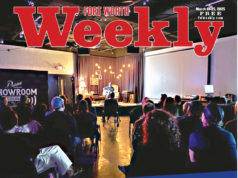“Want to do that three-four one?” guitarist Austin Kroll asked his bandmates before launching into a funky riff.
Drummer Miro Hernandez, seated nearby, entered cautiously with sparse drumwork, as if waiting to see what the vibe from the other musicians would be. After sitting back for a few minutes, flutist Juan Ospina, who had offered his Southside home for the rehearsal, blew some fluttering tremolos as bassist Clayton Coblentz grounded the growing soundscape in a deep Latin-funk groove.
Olemano, the jazz fusion quartet that pulls heavily from Colombian rhythms, is the musical brainchild of Ospina. The Colombian multi-instrumentalist moved to Fort Worth 10 years ago to study at the TCU School of Music. His prior studies in his homeland taught him the tenets of formal classical training and the complex rhythms of Colombia’s indigenous peoples, Ospina said.
With classical “flute, no one invites you to” play gigs, he added. “No one was dancing to the music we were doing.”
Ospina found creative outlets for his instrument performing for Ronnie Heart’s band, which is known for high-energy performances of original pop, funk, neo-disco, and Latin songs that feature extended flute solos. Through that connection, Ospina met Kroll and Hernandez.
“I loved the idea of what Ronnie was doing,” Ospina recalled.
Hernandez, Kroll, and Ospina first performed Ospina’s songs at a house party/art show in 2018. The addition of Coblentz solidified the quartet, and the band performed at now-shuttered La Zona on the Near Southside throughout 2019.
That year was a learning experience, Ospina said. The band members were working toward a sweet spot between polished arrangements and untethered improvisation.
“We do a lot of rearrangements, which I think is healthy,” Kroll said. “I don’t think there will ever be a perfect version of our songs. I think it allows a lot of room for creativity and improvisation.”
Adding another level of complexity are prerecorded tracks that add strings, synth, and percussion effects to Olemano’s songs, but even those elements are subject to spontaneous changes.
“When we are live, sometimes I just turn off the computer because we are so connected,” Ospina said, referring to periods of extended solos that are a hallmark of Olemano’s performances.
Ospina and his bandmates started 2020 with high expectations — both for their increasingly complex performances and the number of gigs they expected to churn out after working through material at La Zona gigs.
“As musicians, we all predict that there will be roadblocks, but I don’t think anyone predicted not being able to work at all,” Kroll said.
Olemano was one of six musicians/groups awarded a $5,000 Sounds of Resilience grant from Fine Line Group, an investment fund owned by Sasha and Ed Bass. The quartet was slated to perform at the 2020 Festi Jazz Popayán, an international jazz festival where TK, in December. In lieu of an in-person live performance, the quartet recorded a video at Niles City Sound (Leon Bridges, Band X, Band Y) that was streamed to audiences in Colombia.
“In the recording, it felt like everything came together,” Hernandez said. “It represents what we’ve been doing.”
Olemano is primed to perform at festivals across the country once the pandemic subsides, Ospina said. The flutist recently moved to California to head a music education program called El Sistema that uses publicly funded youth orchestras to effect social change. Hernandez and Kroll are weighing whether to make the move to the West Coast, too.
“I love music festivals,” Ospina said. “I know it will take a while for festivals to come back. Before, I had the opportunity to travel with other bands. I want to bring Olemano that experience.”












